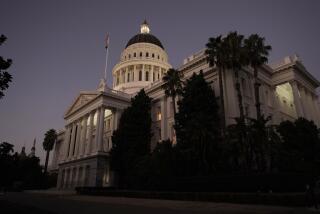Car Seizure Law Stalled in Some Areas
Nearly six months after a much-ballyhooed state law went into effect allowing authorities to seize and sell the cars of unlicensed drivers, many police agencies--including the Los Angeles Police Department--are not enforcing it.
“It will be enforced,” promised Sgt. Bob Rieboldt of the LAPD’s traffic coordination section. “There’s no doubt about that. It’s just taking some time to get the administrative end straightened out.”
The law is being enforced in some cities, however. In Santa Barbara, for example, police have sold 48 cars of unlicensed drivers, including several seized within hours after the law took effect on Jan. 1.
The Safe Streets Act of 1994 empowered authorities to sell the cars of anyone caught a second time driving without a license or on a suspended or revoked license.
Under a separate law that is being widely enforced, police in Los Angeles and other cities have impounded for 30 days hundreds of cars--ranging from clunkers to luxury sedans.
That law, which also took effect Jan. 1, has resulted in unlicensed drivers losing the cars nonetheless. But that’s because the owners chose to let the city sell their cars, usually older models worth less than if they paid the towing and storage fees and parking fines, which can run several hundred dollars. The motorists receive none of the money.
But many cities are not enforcing the tougher law, which does not give unlicensed drivers with a prior misdemeanor conviction for driving without a license within the past five years a chance to get their cars back.
“It’s really a shame,” said Pamela L. Iles, an Orange County Municipal Court judge who lobbied hard for the legislation after seeing people lose their license and drive away from the courthouse.
What has happened with the new vehicle forfeiture law offers an interesting case study of how legislation can run into bureaucratic problems once the glare of the TV lights dim.
*
The measure was prompted by estimates that 1.7 million Californians--about 8% of the state’s motorists--are driving with suspended or revoked licenses or without ever having been licensed.
Unlicensed drivers--many of them convicted drunk drivers--are four times more likely to be involved in fatal accidents, officials say. And they often lack car insurance.
In a recent incident, a man without a driver’s license was accused of running down and killing three young women in a hit-and-run accident in Bell, southeast of Downtown Los Angeles.
Before the new laws took effect, unlicensed drivers could retrieve their car the same day it was seized by bringing a licensed driver to the impound lot.
LAPD Sgt. Rieboldt said officers “can’t wait” to enforce the law, but the department needs time to draft guidelines to implement the measure.
“L.A. is a big city, and nothing is done quickly or easily,” he said.
Officials offer conflicting explanations for the delays, and an angry Assemblyman Richard Katz (D-Panorama City), who authored the Safe Streets Act, said he cannot understand why it has taken so long to implement the law.
Rieboldt said the Police Department was waiting for the district attorney to draft legal guidelines. A district attorney’s spokeswoman said the guidelines were distributed in March, and the D.A.’s office is waiting for police to bring vehicle forfeiture cases to the office.
“We are ready and willing to review cases, but they haven’t been brought to us,” said Margaret Barreto-Morehouse, special assistant to the district attorney’s chief deputy.
The district attorney’s office in December expressed concern about the cost of implementing the law because of “staffing, training in civil forfeiture procedure and notification--all of which our budget cannot absorb.”
Proceeds from the sale of forfeited vehicles go to pay off the car loan, towing and impound costs. Any money left over is split between local and state government.
Officials speculated that police believe they can remove unlicensed drivers from the roads with less paperwork and less hassle by impounding cars rather than enforcing the tougher--and more cumbersome--vehicle forfeiture law.
“The goal is to get these vehicles off the roadway,” said Ellen Sarmiento, supervising city attorney at Los Angeles traffic court.
“We certainly will implement the law as soon as the law enforcement agencies decide they want to go forward with it,” she added.
In Long Beach, police have aggressively enforced the impound law but, like their Los Angeles counterparts, have yet to enforce the vehicle forfeiture law.
Nonetheless, Joe Osuna, manager of the towing operations bureau for the city, reported that the impound lot has been full: Nearly 2,000 cars have been seized from unlicensed drivers since Jan. 1. In most cases, the owners have walked away from their cars rather than pay the impound fees.
But Katz said he is not satisfied, “especially since I know it would save lives.”
“Here is a law that every cop in the state wanted,” he said. “It took a year to get the law passed, and now, it’s almost like I have to go out and seize the car myself and sell it myself in order to get the bill implemented.”
More to Read
Sign up for Essential California
The most important California stories and recommendations in your inbox every morning.
You may occasionally receive promotional content from the Los Angeles Times.










